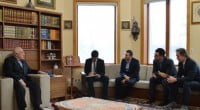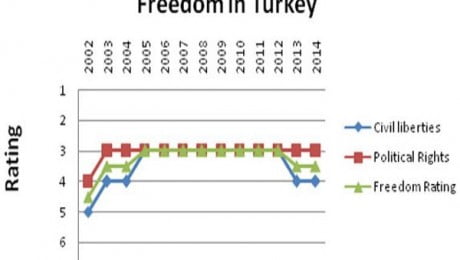Keyword: Hizmet (Gulen) movement

Islamic scholar Gülen says Turkey’s graft scandal can’t be covered up
Turkish Islamic scholar Fethullah Gülen has said a recent graft scandal that has rocked Turkey for nearly five weeks cannot be covered up despite massive efforts by the authorities to weather it down and crush those who speak out on the matter.

Powerful but reclusive Turkish cleric (BBC Interviews Fethullah Gulen)
Speaking to the BBC’s Newshour, Fethullah Gulen said: “It is not possible for these judges and prosecutors to receive orders from me.” Fethullah Gulen has been called Turkey’s second most powerful man. He is also a recluse, who lives in self-imposed exile in the US.

Erdoğan’s AKP runs out of steam, then what?
We are now in the midst of a system crisis with unprecedented dimensions and unforeseen consequences. Turkey’s fiercely embattled Prime Minister Recep Tayyip Erdoğan is betting whatever the country has gained over the past years on a game of prospects that will either lead to a downfall, or turn the stakes in such favor for himself so as to speed up his irresistible rise to untouchability.

Losing rationality in politics and the economy
Turkey has a weak record of institutionalization. Despite the “We are a big state” narrative, today, Turkey’s political model is simple: the leader and the nation. Lacking effective institutions that can accommodate political fluctuations, crises of various calibers can harm Turkey’s stability easily.

Ministerial bureaucrats being purged over their alleged affiliations with Hizmet
Radikal said the only criteria in these purges is the “parallel state,” a term the government uses to define those bureaucrats known to favor the Hizmet movement, which is a grassroots movement based on voluntary participation to spread interfaith dialogue and tolerance with a particular emphasis on education.

Minister says ‘parallel state’ claims not realistic, cites lack of evidence
Customs and Trade Minister Hayati Yazıcı told reporters on Saturday in the Black Sea town of Rize that there is a lack of evidence to substantiate claims of a “parallel state,” recalling the government’s motto of “one state, one flag, one homeland, one nation.”

Hizmet movement and Kurdish question in Turkey
Through educational projects, the Hizmet movement helped to alter the social fabric of Turkish people who consciously or otherwise supported the institutional resistance of state and governmental bodies. Through dialogue and face-to-face encounters, Turkish people have had the chance to experience and feel the grievances of their Kurdish brothers and sisters and listen to their stories.

Kimse Yok Mu continues to care for needy Pakistanis
The foundation gave away sewing machines to 125 women, mainly widowed. The volunteers currently provide fabric backup and thus enable the families to make their living. The foundation will also offer 3-month-long sewing training on demand. Additionally, a total of 50 wheelchairs were delivered to those in need in Khyber Pakhtunkhwa. The donations were well-received by the locals, putting a smile on the faces.

‘Washington has no interest in using Gülen against AKP,’ former US envoy says
The U.S. has no desire to use Fethullah Gülen, who lives in self-imposed exile in America, as a tool against Ankara, said James Holmes, a former U.S. envoy to Ankara. Ties between Ankara and Turkey might be on the frosty side, but Turkey continues to be an important ally for the U.S., according to Holmes.

Swoboda accuses Erdoğan of using Hizmet movement as a pretext
Socialist leader Hannes Swoboda asked “You were still supporting the Hizmet movement a year ago. Now you use the movement as an excuse for halting reforms. Why do you see them as a danger to Turkey now?”
Sources said Swoboda made it very clear that the EU was very concerned about the state of the rule of law in Turkey. “We are very concerned about the rule of law and the separation of powers, especially the independence of the judiciary,” he stressed.

[Cafe Capital] Excessive attempts to manipulate people’s perceptions to backfire
The tension caused by a Supreme Board of Judges and Prosecutors (HSYK) bill that is designed to restructure the HSYJ, the witch-hunts against police officers, teachers and other public employees who have been profiled as members of the Hizmet community (Gülen movement) and the victimization of tens of thousands of people have created unease among the general public. People started reacting negatively to the accusations and slander, which went far beyond the limits of criticism against the Hizmet community, and started saying: “This is too much!

EC official: Turkey should address issues within limits of rule of law
Turkey should deal with its problems within the confines of the rule of law and the legal instruments of democratic societies, Alexandra Cas Granje, European Commission (EC) director of enlargement, has said in reference to a recent corruption scandal and draft bill on the Supreme Board of Judges and Prosecutors (HSYK).

AKP winning perception war !
The probe, which many predicted to be the end of the Justice and Development Party (AKP), has become a war of perception. If you google “graft,” “bribery” or “corruption” in Turkish, you will see the focus has already shifted to a concept so far unheard of in Turkish politics (the “parallel state”), reassigning public prosecutors and police officers to different posts, condemning all sorts of “disinformation” and changing laws governing the structure of the judiciary.



















